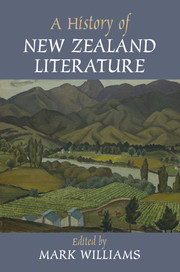Introduction
Published online by Cambridge University Press: 05 April 2016
Summary
Katherine Mansfield describes New Zealand as ‘a little land with no history’ in a poem that Allen Curnow included in his 1960 Penguin Book of New Zealand Verse. ‘To Stanlislaw Wyspianski’ (1910) is addressed to a dead Polish patriot and contrasts the heroic scale of his art with the crude wrestling of New Zealand settlers with the soil. But Mansfield does acknowledge that the country is ‘making its own history, slowly and clumsily’. For Curnow also, the nation is made slowly, but by way of difficult confrontations with its history. History in a settler nation is a continual disappointment for Curnow and Mansfield, but for Curnow, by hard imaginative effort on the part of readers as well as writers, it might yet become an instrument of making both a nation and a literature capable, in a phrase that echoes through this book, of ‘standing upright here’.
This volume begins not with writing that demands a strenuous exercise of reading, like Curnow's great history poems of the 1940s, but with exploration narratives, poetry by Englishwomen who would never set foot here, ethnographical observations by travellers, and ballads by semiliterate whalers – the pre-history of New Zealand literature. Such writing, discussed by Ingrid Horrocks in her chapter opening Part I, was not written for a New Zealand reader. The term New Zealander in the late eighteenth century and well into the nineteenth century referred not to Europeans but to Māori. Yet Māori rapidly became readers as well as producers of text. The view from the boat rather than the beach has traditionally governed description of early contact between Europeans and ‘New Zealanders’, an arrogance of the eye that Hamish Clayton unsettles in his 2010 novel Wulf. Yet from the shore as well as the ship this contact, or arrival, was seen as potential advantage as well as threat. Māori engaged rapidly with the technological, trading, military, and (more sceptically) the theological opportunities afforded by whalers, settlers, soldiers, missionaries – and the books they carried with them. As Arini Loader shows, closely examining Hakaria Kiharoa's 1850s textualising of a Māori poem, such recordings continue rather than merely preserve a literature that reaches back long before the arrival of script.
- Type
- Chapter
- Information
- A History of New Zealand Literature , pp. 1 - 14Publisher: Cambridge University PressPrint publication year: 2016

